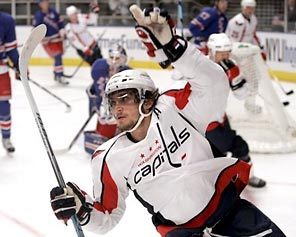When Tomas Vokoun signed with the Washington Capitals in the first week of free agency this summer, the 35-year-old Czech native wasn’t shy about telling anyone that would listen that he took a significant cut in pay to play for the Capitals.
Wait, what was that?
Vokoun made $6.5 million last season with Florida, the last year of a multi-year contract with the Panthers. He turned down multi-year, more lucrative offers from the Panthers to make less than a quarter of that this season, $1.5 million for one year in DC.
I’m not sure I followed that. The more lucrative offer was where he was already playing?
 See, this is a foreign concept for D.C. sports fans, especially Capitals fans. For decades, we watched stars take less money to avoid the Beltway.
See, this is a foreign concept for D.C. sports fans, especially Capitals fans. For decades, we watched stars take less money to avoid the Beltway.
None of this was ever confirmed by the players, but many high-profile hockey stars were known to have turned down more lucrative offers from the Capitals to play elsewhere in the 80s and 90s (nobody can fault players for avoiding D.C. in the 70s).
I never faulted the players who turned down bigger deals from the Capitals to stay where they were. Sometimes, the right decision for your family isn’t the most lucrative one for you; besides, a million to a guy making multiple millions for decades isn’t as much as it is to us common folk.
I also understood that some players turned down D.C.’s bonanzas to play in their hometowns. Toronto, Montreal, Calgary, Detroit and Boston have made a veritable paper fortune banking on this hometown discount.
(It’s worth noting that Potomac, Maryland native Jeff Halpern gave the Capitals a hometown discount for his services next season—that is definitely the first time in history that’s happened! But it won’t be the last: some D-I college hockey scouts say that D.C. is now a must-visit on the recruiting trail. That’s really exciting to guys like me who grew up playing youth hockey in the area. And I don’t regret this not being part of my club hockey career—my position of Left Bench was already occupied at most schools.)
I was perpetually frustrated by the players who signed with new teams and took less money than what the Capitals were offering. In the 80s and 90s, the Capitals were a regular playoff team, including a 19-year run of post-season play, but were always just one or two players away from jumping the big hurdle.
There were flashes of brilliance: Dale Hunter clinching the series for the Caps, after D.C. trailed the Flyers 3-games-to-1, with an incredible overtime goal in Game 7 in 1988; the run to the conference final in 1989, when the Druce was Loose to knock out the vaulted Rangers and pushing the Caps further than they had ever gone before; the run to the Stanley Cup final in 1998 against Detroit, when all of the pieces just seemed to fall into place until Esa Tikkanen deked Chris Osgood but slid the puck wide of the empty net in Game 2.
 The fan base was loyal and motivated—sure, it wasn’t Toronto or Boston or even St. Louis, but surely D.C. was a better stop than, say, a dying Minnesota North Stars franchise, the remote village of Quebec City (to non-francophones, anyway) or Hartford, the insurance capital of America.
The fan base was loyal and motivated—sure, it wasn’t Toronto or Boston or even St. Louis, but surely D.C. was a better stop than, say, a dying Minnesota North Stars franchise, the remote village of Quebec City (to non-francophones, anyway) or Hartford, the insurance capital of America.
What would have happened if just one of those big-name stars gave Washington a chance?
And then it happened. A bona fide superstar gave D.C. and the Capitals that chance: Alexander Ovechkin. In a now-infamous article, The Hockey News suggested at the start of the 2007-08 campaign that the Capitals should trade Ovechkin and rebuild with depth instead of relying on one star. Traditional theory held that Ovie needed out of D.C. to start building his legacy. Instead, Ovie bunked tradition and signed a 13-year, $124 million deal to essentially pledge his entire career to Washington. That signature single-handedly put D.C. on the proverbial hockey map. Who wouldn’t want to play with the game’s most exciting star?
Capitals fans know this part of the story already: Building sells out—perpetually; Caps make the playoffs—perpetually; Caps become the darlings of the league and the city, and NBC’s Al Michaels notes on Sunday Night Football that there are more Capitals jerseys than Redskins jerseys in the stands at FedEx Field.
And now this: Jason Arnott waives his no-trade clause at last year’s trade deadline—for one team. Tomas Vokoun takes a 76.6% paycut to play in D.C.
I still have to pinch myself just thinking about it.
